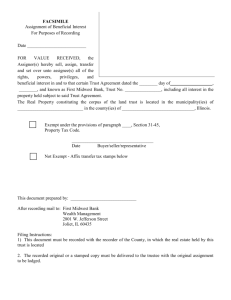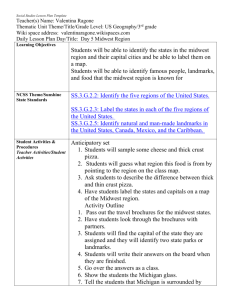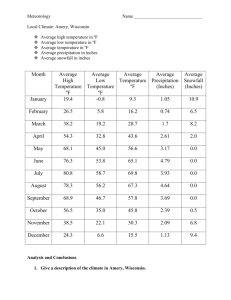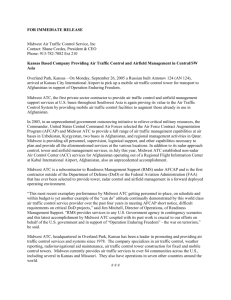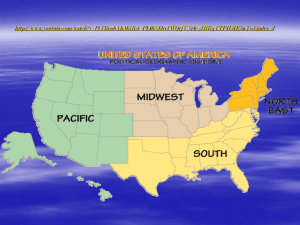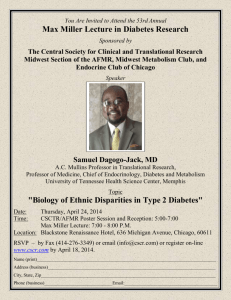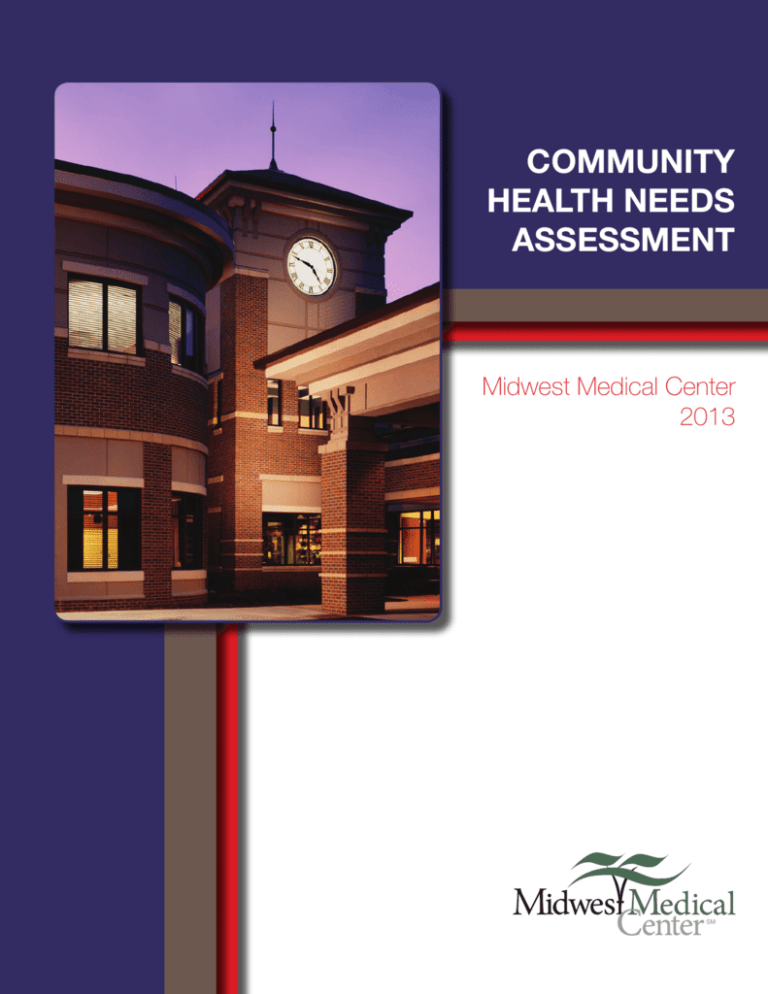
COMMUNITY
HEALTH NEEDS
ASSESSMENT
Midwest Medical Center
2013
COMMUNITY
HEALTH
NEEDS
ASSESSMENT
2013
Midwest Medical
Center
Copyright ©2013 by the Illinois Critical Access Network (ICAHN). All rights reserved. The contents of this publication
may not be copied, reproduced, replaced, distributed, published, displayed, modified, or transferred in any form or
by any means except with the prior permission of ICAHN. Copyright infringement is a violation of federal law subject
to criminal and civil penalties.
Midwest Medical Center
| 1
COMMUNITY
HEALTH
NEEDS
ASSESSMENT
2013
TABLE OF CONTENTS
Process
Purpose . . . . . . . . . . . . . . . . . . . . . . . . . . . . . . . . . . . . . . . . . . . . . . . . . . . . . . . . . . . . . . . . . 3
Scope of Assessment . . . . . . . . . . . . . . . . . . . . . . . . . . . . . . . . . . . . . . . . . . . . . . . . . . . . . . . 3
Methodology and Gaps Discussion . . . . . . . . . . . . . . . . . . . . . . . . . . . . . . . . . . . . . . . . . . . . 4
Community
Geographic Assessment Area Defined . . . . . . . . . . . . . . . . . . . . . . . . . . . . . . . . . . . . . . . . . . 5
Demographic Profile . . . . . . . . . . . . . . . . . . . . . . . . . . . . . . . . . . . . . . . . . . . . . . . . . . . . . . . . 6
Economic Profile . . . . . . . . . . . . . . . . . . . . . . . . . . . . . . . . . . . . . . . . . . . . . . . . . . . . . . . . . . . 7
Input
Health Profiles from Existing Studies and other Secondary Data . . . . . . . . . . . . . . . . . . . . . . 10
Primary Source Information . . . . . . . . . . . . . . . . . . . . . . . . . . . . . . . . . . . . . . . . . . . . . . . . . 14
Prioritization
Reconciliation of Primary Source Information with Secondary Data . . . . . . . . . . . . . . . . . . . . 18
Summary of Findings and Recommendations . . . . . . . . . . . . . . . . . . . . . . . . . . . . . . . . . . . . 19
Resource Inventory
Midwest Medical Center . . . . . . . . . . . . . . . . . . . . . . . . . . . . . . . . . . . . . . . . . . . . . . . . . . . . 20
Area Health Services Review . . . . . . . . . . . . . . . . . . . . . . . . . . . . . . . . . . . . . . . . . . . . . . . . 21
Remarks
Remarks . . . . . . . . . . . . . . . . . . . . . . . . . . . . . . . . . . . . . . . . . . . . . . . . . . . . . . . . . . . . . . . . 24
Appendix
Participants . . . . . . . . . . . . . . . . . . . . . . . . . . . . . . . . . . . . . . . . . . . . . . . . . . . . . . . . . . . . . 25
Collaborators . . . . . . . . . . . . . . . . . . . . . . . . . . . . . . . . . . . . . . . . . . . . . . . . . . . . . . . . . . . . 28
Midwest Medical Center
| 2
COMMUNITY
HEALTH
NEEDS
ASSESSMENT
2013
Process
Purpose
The mission of Midwest Medical Center is to “provide the
members of the community caring, competent, and cost
effective healthcare.” In the past, Midwest Medical Center has
employed many different methods to assess the health needs
of the area it serves and has adjusted its services to meet those
identified needs. Recent changes to federal laws governing
not-for-profit hospitals now require that most of those hospitals,
including Midwest Medical Center, conduct local Community
Health Needs Assessments every three years and report the
completion of those assessments as part of their corporate tax
filings with the Internal Revenue Service.
The mission of
Midwest Medical
Center is “to
provide the
members of the
community caring,
competent, and
cost effective
healthcare.”
Assessing community health needs through a review of available health data and discussion
with area health care partners, local officials, community leaders, and representatives of the
many groups served by the hospital give Midwest Medical Center and its health care partners
the opportunity to identify and address the area’s most pressing health care needs.
Scope of Assessment
Midwest Medical Center elected to conduct a Community Health Needs Assessment in 2013.
The Community Health Needs Assessment was developed and conducted by a consultant
provided through the Illinois Critical Access Hospital Network (ICAHN).
ICAHN is a not-for-profit 501(c)(3) corporation, established in 2003 for the purposes of sharing
resources, education, promoting operational efficiencies, and improving health care services
for member critical access hospitals and their rural communities. ICAHN, with 52 member
hospitals, is an independent network governed by a nine-member board of directors, with
standing and project development committees facilitating the overall activities of the network.
ICAHN continually strives to strengthen the capacity and viability of its members and rural
health providers. Midwest Medical Center is a member of the Illinois Critical Access Hospital
Network.
The Community Health Needs Assessment will serve as a guide for planning and implementation of health care initiatives that will allow the hospital and its partners to best serve the
emerging health needs of Galena and all of Jo Daviess County.
Midwest Medical Center
| 3
COMMUNITY
HEALTH
NEEDS
ASSESSMENT
2013
Methodology and Gaps Discussion
The Community Health Needs Assessment was conducted through a consulting arrangement
with the Illinois Critical Access Hospital Network. Terry Madsen, an ICAHN consultant, attorney,
former educator, and community development specialist, met with hospital executive staff to
define the community, scope of the project, and special needs and concerns. An internal
working group, possible local sources for secondary data, and key external contacts were
identified and a timeline was established.
Possible avenues for gathering primary data were reviewed, and it was determined to proceed
with three focus groups – comprised of area healthcare professionals/partners, local officials,
community leaders, and community officials.
Quantitative information from the U.S. Census was collected at the zip code level utilizing
ESRI Solutions’ analysis providing categorical demographic and economic information and
variables for multiple years of past and future data allowing for identification of trends over time
and projections. Additional data was collected from the Illinois Department of Labor, Illinois
Department of Revenue, and the Illinois State Board of Education.
Information and data from other secondary sources, utilizing their own methodologies, were
collected for this report from Kaiser State Health Facts – The Kaiser Family Foundation, Illinois
County Health Rankings – Robert Wood Johnson Foundation, State Cancer Profiles – The
National Cancer Institute, Community Health Status Indicators – U.S. Department of Health
and Human Services, Illinois Behavioral Risk Factor Surveillance System, which provides health
data trends through the Illinois Department of Public Health, in cooperation with the Center for
Disease Control and Prevention, Office of Surveillance, Epidemiology and Laboratory Services.
Qualitative information from primary sources including focus groups was collected and analyzed
for common themes concerning the service area population in general and themes potentially
impacting health concerns or delivery of health services for any persons who may be potentially
medically underserved, low income, minority, or suffering chronic disease needs. Primary and
secondary information was analyzed for confirmation of themes in order to identify needs.
Potential information gaps were discussed relative to the population of persons of Hispanic
origin, and also of persons who are living in poverty in the Midwest Medical Center service
area. This assessment has explored the insular needs of these identified groups by specifically
seeking input from persons with knowledge of the specific health concerns. Input was also
sought from members of the community charged professionally with advancing the health and
education of the community and all its members, including school officials and the Jo Daviess
Health Department. Because of the individuals interviewed, these gaps were avoided.
As with many rural areas, secondary data is often a year or more out-of-date, which highlights
the importance of historic trends in that data in the service area.
Secondary data from state, federal, and professional sources, which are cited in text, were
reviewed by the consultant and compared to the primary data gathered. Identified needs were
prioritized through that process and presented to hospital administration for review.
Midwest Medical Center
| 4
COMMUNITY
HEALTH
NEEDS
ASSESSMENT
2013
Community
Geographic Assessment Area Defined
The Midwest Medical Center community was identified through a facilitated meeting with
senior staff as a geographic area determined to be the current primary and secondary hospital
service areas which includes all or portions of the zip code service areas surrounding Galena,
Elizabeth, Scales Mound, East Dubuque, Hanover, Warren, and Apple River, IL, and Hazel
Green, WI. This geographic area definition of community is well-suited to Midwest Medical
Center, a designated critical access hospital providing basic, primary care through inpatient
care, ancillary services, clinics, and specialty clinics to residents of a rural area.
Major medical centers in Rockford, IL, Dubuque, IA, and other locations receive patients from
the service area.
Illustration 1. Midwest Medical Center Service Area
(ESRI – 2013)
Midwest Medical Center
| 5
COMMUNITY
HEALTH
NEEDS
ASSESSMENT
2013
Demographic Profile
Table 1. Population by Race – Midwest Medical Center Service Area
2012
RACE and ETHNICITY
2017
Number
Percent
Number
Percent
21,486
93
43
69
97.1%
0.4%
0.2%
0.3%
21,311
101
47
74
96.6%
0.5%
0.2%
0.3%
Pacific Islander
Other
11
231
0.0%
1.0%
12
302
0.1%
1.4%
Two or More Races
196
0.9%
214
1.0%
Hispanic Origin (any race)
624
2.8%
772
White
Black
American Indian
Asian
3.5%
(ESRI – 2013)
The race and ethnicity makeup of the service area indicates that the numbers are typical of
many locations in rural Illinois. No significant change in the profile is projected over the next five
years. It should be noted that anecdotal information collected from the focus groups suggests
that the population of Hispanic origin residents may be higher than census data reports for
both the hospital service area and the Galena zip code alone. The percentage of Hispanic
students in Galena CUSD 120 has risen from 2.6% Hispanic students in 2000 to 10.5% in
2012.
The broad demographic profile of the Midwest Medical Center service area was determined
from data reported by the U.S. Census Bureau and the Environmental Systems Research
Institute, Inc. (ESRI). The following chart and data profile trends in the demographic environment surrounding the Midwest Medical Center service area.
Table 2. Demographic Trends – Midwest Medical Center Service Area
SUMMARY
Population
Households
Families
Average Household Size
2010
22,008
2012
22,129
2017
22,061
9,416
6,315
9,411
6,283
9,519
6,321
2.32
2.33
2.30
Owner Occupied Housing Units
7,491
7,400
7,523
Renter Occupied Housing Units
1,925
2,011
1,996
46.8
47.5
49.0
Median Age
TRENDS: 2011-2016 Annual Rate
Population
AREA
U.S.
-0.06%
0.68%
Households
0.23%
0.74%
Families
0.12%
0.72%
Owner Households
0.33%
0.91%
Median Household Income
1.43%
2.55%
(ESRI – 2013)
The overall population of the service area is trending toward a small decline, while related
demographic categories are expected to trend toward modest increases. The median age is
projected to continue to increase over the next five years to 49 years of age. This is slightly
higher than many rural areas in Illinois.
Midwest Medical Center
| 6
COMMUNITY
HEALTH
NEEDS
ASSESSMENT
2013
Table 3. Population Age Trends – Midwest Medical Center Service Area
20.0%
2012
18.0%
17.5%
17.1%
2017
16.0%
13.1%
12.0%
9.4%
10.0%
8.0%
6.0%
14.9%
14.5%
14.0%
5.6%
6.0% 5.9%
5.5%
5.4%
5.1% 5.1%
9.4%
12.7%
10.7%
10.3%
6.3% 6.4%
5.1%
4.0%
4.3%3.8%
2.8% 2.9%
2.0%
0.0%
0-4
5-9
10-14
15-19
20-24
25-34
35-44
45-54
55-64
65-74
75-84
85+
Age Category
(ESRI – 2013)
The Midwest Medical Center service area is projected to gain population distribution in all
groupings over age 55, and experience declines in most other groups. This pattern is not
unusual when compared to much of rural Illinois.
Economic Profile
Table 4. Household Income Profile – Midwest Medical Center Service Area
2012
HOUSEHOLDS BY INCOME
2017
Number
Percent
Number
Percent
<$15K
915
9.7%
871
9.2%
$15K-$24K
1,036
11.0%
836
8.8%
$25K-$34K
1,171
12.4%
942
9.9%
$35K-$49K
1,508
16.0%
1,432
15.0%
$50K-$74K
2,297
24.4%
2,648
27.8%
$75K-$99K
1,311
13.9%
1,513
15.9%
$100K-$149K
824
8.8%
880
9.2%
$150K-$199K
246
2.6%
289
3.0%
$200K+
103
1.1%
108
1.1%
2012
2017
Median Household Income
$50,495
$54,217
Average Household Income
$58,900
$63,152
Per Capita Income
$25,130
$27,333
(ESRI – 2013)
Median household income for 2012 was estimated at $50,495 in the Midwest Medical Center
service area, compared to $50,502 in 2011 for all U.S. households. The median household
income in Illinois was $53,234 for 2011. Median household income in the service area is
projected to be $54,217 in 2017. The median household income in the hospital service area
is higher than many rural Illinois communities. Median household income is the amount where
one-half of the households in an identified area have a higher income and one-half of the
households have a lower income. (ESRI – 2013, U.S. Census 2012)
Median home value in the area is $112,170, compared to a median home value of $167,749
for the U.S. In five years, median value is projected to increase to $123,471.
Midwest Medical Center
| 7
COMMUNITY
HEALTH
NEEDS
ASSESSMENT
Table 5. Employment by Industry – Midwest Medical Center Service Area
CATEGORY
2013
EMPLOYED
% OF WORKING
POPULATION
Manufacturing
1,759
15.2%
Accommodations and food services
1,392
12.0%
Retail trade
1,247
10.8%
Health care and social assistance
1,113
9.6%
Construction
935
8.1%
Educational services
800
6.9%
Other services, except public administration
635
5.5%
Agriculture, forestry, fishing, and hunting
610
5.3%
Finance and insurance
508
4.4%
Professional, scientific, and technical services
460
4.0%
Transportation and warehousing
406
3.5%
Arts, entertainment, and recreation
342
2.9%
Administrative and support and waste management
328
2.8%
Public administration
308
2.7%
Wholesale trade
256
2.2%
Information
222
1.9%
Real estate, rental, and leasing
191
1.6%
Utilities
50
0.4%
Management of companies and enterprises
18
0.2%
Mining, quarrying, and oil and gas extraction
14
0.1%
(ESRI – 2013)
The service area enjoys diverse employment opportunities overall. The fourth largest
employment group is healthcare and social assistance. Midwest Medical Center and its
supporting services and partners are included in this group. Midwest Medical Center plays
an important role in the economic vitality of the area as well as its health.
The annual average unemployment rate for Jo Daviess County was 7.4% for 2012, compared
to 8.9 percent for Illinois, and 8.1% for the U.S.
Table 6. Sales Tax Collected – Midwest Medical Center Service Area
FY 2013 FY 2012 FY 2011 Galena
$1,863,113
$1,885,052
$1,855,664
Elizabeth
$98,811
$95,659
$97,239
Hanover $27,243
$29,191
$25,594
(ESRI – 2013)
Within the hospital service area in 2012, 89% of persons age 25 or over had attained at least
a high school diploma, compared to 87% statewide (2011). Twenty-two percent had attained
a bachelor’s degree or higher, compared to 31% in the state overall. (ESRI – 2013)
Midwest Medical Center
| 8
COMMUNITY
HEALTH
NEEDS
ASSESSMENT
2013
Low-income students are pupils ages 3 to 17, inclusive, from families receiving public aid,
living in institutions for neglected or delinquent children, being supported in foster homes
with public funds, or eligible to receive free or reduced-price lunches. The percentage of
low-income students is the count of low-income students, divided by the total fall enrollment,
multiplied by 100. A large portion of the service area is included in five public school districts
reflecting the following levels of low income students:
Percent Low-Income Students
2000
2012
14.0
31.4
22.9
31.6
22.3
34.4
12.1
23.5
21.5
33.1
District Galena CHSD 101 East Dubuque CUSD 119
River Ridge CUSD 210
Scales Mound CUSD 211
Warren CUSD 205
The population of low income students for the state of Illinois went from 36.7% low income
students in 2000 to 49% in 2012. All area schools were well below state percentages.
The Midwest Medical Center service area is experiencing unemployment numbers that are
better than many rural areas of Illinois. Sales tax revenue has fluctuated moderately in the
sample communities during the last three fiscal years. Numbers of children eligible for free
or reduced lunch are increasing but lower overall when compared to numbers found in other
rural areas and the state percentage. Median income and housing values are lower than state
numbers but higher than many rural communities in Illinois. The service area seems to be in a
better overall economic position than many rural communities in Illinois today.
The service area’s social and economic picture is influenced by the fact that 73% of the
land area in Jo Daviess County consists of farms, according to 2007 data from the USDA.
Thirty-nine percent of farm operators in Jo Daviess County work off-farm.
(Atlas of Rural and Small Town America, 2013)
The Midwest Medical Center service area is marked by small communities relying primarily
on small businesses and industries, tourism and niche retail, agriculture, and other service
providers for its local employment.
The demographic/economic profile of the Midwest Medical Center service area overall is
better than many rural Illinois communities. In the near term, the profile is expected to remain
substantially similar in most categories reviewed for this assessment. This knowledge provides
context for planning for the specific health needs identified in the following sections of this
assessment.
Midwest Medical Center
| 9
COMMUNITY
HEALTH
NEEDS
ASSESSMENT
2013
Input
Health Profiles from Existing Studies
and other Secondary Data
Secondary data reports and other resources were reviewed for this assessment in order to
provide points of comparison for the primary facts and anecdotes offered through the primary
information collection process. Those secondary sources included:
• Kaiser State Health Facts – The Kaiser Family Foundation
• Illinois County Health Rankings – Robert Wood Johnson Foundation
• State Cancer Profiles – The National Cancer Institute
• Community Health Status Indicators – U.S. Department of Health and Human Services
• Illinois Behavioral Risk Factor Surveillance System (IBRFSS), which provides health data
trends through the Illinois Department of Public Health in cooperation with the Center
for Disease Control and Prevention, Office of Surveillance, Epidemiology and Laboratory
Services
• County Health Rankings
The County Health Rankings rank the health of nearly every county in the nation and show that
much of what affects health occurs outside of the doctor’s office. The County Health Rankings
confirm the critical role that factors such as education, jobs, income, and environment play in
how healthy people are and how long they live.
Published by the University of Wisconsin Population Health Institute and the Robert Wood
Johnson Foundation, the Rankings help counties understand what influences how healthy
residents are and how long they will live. The Rankings look at a variety of measures that affect
health such as the rate of people dying before age 75, high school graduation rates, access
to healthier foods, air pollution levels, income, and rates of smoking, obesity and teen births.
The Rankings, based on the latest data publicly available for each county, are unique in their
ability to measure the overall health of each county in all 50 states on the multiple factors that
influence health. (County Health Rankings and Roadmaps, 2012)
Jo Daviess County is ranked 2 out of the 102 Illinois counties in the Rankings, released in
April 2013.
Table 7. Health Rankings – JoDaviess County
Observation
Adults reporting poor or fair health
Jo Daviess
Illinois
9%
15%
Adults reporting no leisure time physical activity
25%
25%
Adult obesity
29%
27%
Children under 18 living in poverty
16%
21%
Motor vehicle crash rate (per 100,000)
Limited access to healthy food
15
10
5%
4%
Midwest Medical Center
| 10
COMMUNITY
HEALTH
NEEDS
ASSESSMENT
The Illinois Behavioral Risk Factor Surveillance System provides health data trends through
the Illinois Department of Public Health, in cooperation with the Center for Disease Control
and Prevention, Office of Surveillance, Epidemiology, and Laboratory Services.
2013
The following table reflects information from the IBRFSS that indicate areas of likely health
care needs.
Table 8. Diagnosed Disease Factors – Jo Daviess County
35.0%
29.0%
Percentage of Population
30.0%
25.0%
25.0%
29.0% 30.0%
29.0%
26.0%
26.0%
26.0%
20.0%
15.0%
13.0% 13.0%
9.0%10.0%
10.0%
6.0%
5.0%
0.0%
High Blood
Pressure
Arthritis
2003
2006
7.0%
8.0% 8.0%
Diabetes
2009
Asthma
Illinois
(IBRFSS – 2012)
Diagnosis of arthritis exceeded the state level in recent years, and reports of diagnosis of
diabetes and asthma have risen over recent years to reach statewide levels.
Table 9. Health Risk Factors – Jo Daviess County
30.0%
27.0%
Percentage of Population
25.0%
23.0%
23.0%
21.0%
21.0%
21.0%
19.0%
20.0%
18.0%
16.0%
15.0%
21.0%
20.0%
15.0%
10.0%
5.0%
0.0%
At Risk Alcohol
Tobacco
2003
2006
2009
Obesity
Illinois
(IBRFSS, 2012)
Midwest Medical Center
| 11
COMMUNITY
HEALTH
NEEDS
ASSESSMENT
2013
The percent of persons at risk for acute or binge drinking has fluctuated slightly in recent years
but has remained higher than the state percentage. Tobacco use has declined to a point below
the state levels. The rate of persons reporting obesity is below the state level in the IBRFSS
statistics but above the state level in the more recent data available from the County Health
Rankings.
The Illinois Department of Health releases countywide mortality tables from time to time.
The most recent available table for Jo Daviess County, showing the causes of death within
the county is set out below:
Table 10. Incidence by Disease Type – Jo Daviess County
Disease Type
Number of Deaths
Diseases of the Heart
54
Malignant Neoplasms
62
Alzheimer’s Disease
11
Cardiovascular Diseases (Stroke)
14
Chronic Lower Respiratory Diseases
12
Accidents
6
Diabetes Mellitus
0
Influenza and Pneumonia
6
Nephritis, Nephrotic Syndrome, and Nephrosis
6
Septicemia
2
Intentional Self Harm (Suicide)
2
Chronic Liver Disease, Cirrhosis
3
All other causes
47
TOTAL DEATHS
225
(IBRFSS, 2012)
The mortality numbers are much as one would expect with diseases of the heart and cancer
as the leading causes of death in Jo Daviess County. These numbers are consistent with the
mortality reports from the other Illinois counties.
The State Cancer Profiles compiled by the National Cancer Institute list Jo Daviess County at
Level 8 for all cancers, which means that the death by cancer rate overall is similar to the U.S.
rate and is falling over the recent past. (National Cancer Institute, 2010)
The Jo Daviess County Health Department completed the Illinois Project for Local Assessment
of Needs (IPLAN) in 2009. Each health department in the state conducts this process on a
rotating basis. The IPLAN helps to identify local health concerns on a countywide basis and
establish five year plans to address them.
Midwest Medical Center
| 12
COMMUNITY
HEALTH
NEEDS
ASSESSMENT
2013
IPLAN
The IPLAN for Jo Daviess County identified and prioritized the following issues:
1. Obesity
2. Intimate Partner Personal Violence
3. Breast Cancer
4. Prostate Cancer
Synthesized Secondary Data
The demographics for Midwest Medical Center service area reflect similar income when
compared to many other rural areas and lower than Illinois overall.
The service area reports a higher percent of population diagnosed with arthritis than state
percentages and a trending increase in reports of diagnosis of diabetes and asthma that
reached state levels in 2009. Diseases of the heart and cancer are the two leading causes
of death throughout the service area. Obesity and persons at risk for alcohol are above state
levels. Death from motor vehicle crashes is reported as being higher in the service area than
the statewide rate. Adults reporting no leisure time physical activity exceed state levels.
Summary
The secondary data and previous planning conclusions draw attention to several common
issues of rural demographics and economies and draw emphasis to issues related to
wellness, education, and risky behavior with regard to substances, obesity, teen health,
and related issues.
Midwest Medical Center
| 13
COMMUNITY
HEALTH
NEEDS
ASSESSMENT
2013
Primary Source Information
Focus Group #1 – Healthcare Professionals and Partners
A focus group comprised of healthcare professionals and partners met on August 26, 2013.
The group included physicians, a pharmacist, the Jo Daviess County Health Department
administrator, a representative of a nursing home, and others.
The session opened with the identification of several positive events that took place within the
Midwest Medical Center service area during the past five years. The following developments
were cited:
• Development of urgent care locations and extended hour pharmacies in the area
• Access to physicians by agencies is good
• New general surgeons
• Emphasis at federal, state, and local levels on collaboration in assessing community
health needs
• Formation of cancer, obesity, and anti-violence coalitions in the community
• Physician quality and supply is good
• Pharmacies doing vaccinations
• Physician services to senior care centers are good
• Health Department infection control program
• Continual improvement in services to seniors
• Emergency room services are improved with addition of board certified physicians
• MRI and CT scan are available in-house at Midwest Medical Center
• Good communication among doctors and pharmacists concerning people using
multiple medical providers
• Jo Daviess Transit
• Availability of physical therapy
• Access to a critical access hospital
• Fitness center at Midwest Medical Center
The group then discussed a wide variety of health needs and health-related concerns in
several general categories, including:
• Access to specialists for underinsured and uninsured
• Better access transportation for appointments and out of town care
• More surgical opportunities
• Distance to primary care can be an issue
• Mental health
oo No psychiatrists locally, except through tele-psychiatry
oo Post Midwest Medical Center care is hard to find, and arranging transportation
is difficult
oo Inpatient consultants are difficult to access
oo Access to residential mental health
• Funding for agencies
• It can take three weeks to coordinate out of town transportation for appointments
• Providers for speech therapy and occupational therapy
• Pharmacy services can require significant travel
Midwest Medical Center
| 14
COMMUNITY
HEALTH
NEEDS
ASSESSMENT
2013
• Resources for specialists
• Home-based services and home health care for post-surgical, well-baby care, etc.,
are diminishing because of funding loss
• Transportation to cancer treatment and dialysis
• Translation services for non-English speaking patients
• Access to durable medical equipment
• Access to care for veterans
• Childhood obesity is being seen in school physicals and in health department studies
• Geriatric obesity
• Seniors, in particular, are reactive rather than proactive about health and wellness
• Obesity and related issues at all ages
• Cancer rate seems high, especially colon cancer
• Difficulty sustaining some support groups
• Substance abuse, including alcohol, methamphetamines (especially among youth),
and prescription narcotics
oo Theft
oo Sale
oo Patient abuse
• Diabetes
• Lack of personal responsibility and ownership of health
Focus Group #2 – Community Leaders
A focus group comprised of community leaders also met on August 26, 2013. The group
included a representative of the Galena Chamber of Commerce, business leaders, the
Jo Daviess County Coroner, and others.
This session also opened with the identification of several positive events that took place
within the Midwest Medical Center service area during the past five years. The following
developments were cited:
• New home health care services
• Partnership between Midwest Medical Center and home health care providers
• Access to critical access hospital
• Midwest Medical Center facility and services and its partnerships with local services and
agencies
• Affiliation with the University of Illinois emergency room physicians
• Spanish-speaking physician at clinic
• Availability of monthly lab screenings throughout the county and run by Midwest
Medical Center
• Digital imaging equipment, including CT scan, MRI, and digital mammography
• Cooperation among emergency medical services, Med-Flight, and Midwest Medical
Center
• Walk-in Monday program partnership with Galena State Bank for women’s health and
cancer screenings
Midwest Medical Center
| 15
COMMUNITY
HEALTH
NEEDS
ASSESSMENT
2013
Through a facilitated identification process, the group next developed a list of observed or
perceived weaknesses (both current and threatened for the future) in delivery of healthcare
in the Midwest Medical Center service area.
• Pediatric speech therapy and occupational therapy
• Access to dental care for underinsured and uninsured
• Extended pharmacy hours
• Local availability of specialists
• Specialist referrals for underinsured and uninsured are hard to find
• Expanded surgical services
• Promotion of availability of surgical services
• Planning for elder care for aging population
• Memory care for seniors and secure Alzheimers’ care
• Prenatal care for underinsured and uninsured
• Local access to cardiologist
• Local access to dialysis
• Distance for physical therapy away from Galena
• Hospice
• Physician home visits to remote areas of the county or allowing nurse practitioner
to make home visits
• Services for persons on Medicaid
• Mental health
• Limited availability of transfer beds for mental health patients from Midwest Medical
Center and senior centers
• Limited access for transportation out of the area for mental health patients
• Home food services
• Lack of utilization of preventative care
• Diabetes
• Deaths from chronic illnesses related to alcohol
• Prescription abuse by patients
• Delay in treatment for underinsured
• Abuse of system by persons on public aid
• Education about availability of services and also about responsible use
• MRSA, VRE, and some other acquired diseases seem high
Focus Group #3 – Community Officials
A focus group comprised of officials and other leaders, including representation from the Jo
Daviess County Board, the Galena Police Chief, EMS coordinators, and others met on August
27, 2013. The session opened with the identification of several positive events that took place
within the Midwest Medical Center service area during the past five years. The following
developments were cited:
• Collaboration between Midwest Medical Center and the community
• Cooperation between Midwest Medical Center and the police
• Staff at Midwest Medical Center are friendly, competent, and cooperative
• Board certified emergency room physicians at Midwest Medical Center
• Midwest Medical Center is a state-of-the-art facility
• New imaging equipment at Midwest Medical Center
Midwest Medical Center
| 16
COMMUNITY
HEALTH
NEEDS
ASSESSMENT
2013
•
•
•
•
•
•
•
•
•
•
•
•
•
Quality of care at Midwest Medical Center
Cooperation for emergency preparedness by all partners
Ambulance service handles a large area well
Community support for proposed long-term care campus
Midwest Medical Center as an economic engine for the community
Support for Midwest Medical Center is common among agencies
Therapy is available without regard for ability to pay
Public perception of Midwest Medical Center has improved significantly
High volunteerism in emergency services
Local rehabilitative services continue to improve
Swing bed program at Midwest Medical Center
Fitness facility and other facilities at Midwest Medical Center make it a community hub
Continuity of care is very good
The group then discussed health needs and concerns in several categories, including:
• Funding for social services and transportation
• Transportation out of the area
• Obesity
• Security at the hospital
• Orthopedic specialists
• Ophthalmologist
• Mental health
oo Finding post-hospital placement
oo Transportation to placement
oo No local psychiatrist, except tele-psychiatry
• Non-emergency transportation for large wheelchairs and large patients
• Appointments for local transportation are difficult
• There is insufficient funding for low income and assisted living, resulting in inefficiency
and unnecessary costs for care
• Diabetes
• Planning for senior care
• Engage youth in their own health and wellness
• Nutrition education
• Dietitian or nutritionist
• Local physicians and specialists need to utilize Midwest Medical Center whenever
appropriate
• Health Department five-year study indicates that BMI of 72% of school students is high
• Planning for sustainability of local health care resources
• Collaboration for wellness education to all portions of the community
• Recruiting and sustaining volunteer base for emergency medical services
• Provide for training for emergency services volunteers
Midwest Medical Center
| 17
COMMUNITY
HEALTH
NEEDS
ASSESSMENT
2013
NEED IDENTIFICATION
AND Prioritization
Reconciliation of Primary Source Information
with Secondary Data
The reports of the focus groups in the preceding section reflect issues and perceived needs
mentioned by individuals and discussed in those sessions. Each discussion item listed was
not an identified need. Through the qualitative process, items were excluded by further
information, such as being identified as issues currently being addressed by Midwest Medical
Center or another agency or group whose actions were unknown to the person initiating the
subject, or items which were not supported by quantitative data.
Where evident, concerns which survived the discussion process and finding quantitative
support were combined with similar issues to form themes leading to the needs identified,
cross-supported with the secondary data again and then prioritized based on the
emphasis placed on the needs by the informants and the strength of the data supporting
them. In addition, issues raised by quantitative or qualitative sources not common to other
issues but impacting medically underserved, low income, minority, or chronic disease needs
populations were either excluded because they are being currently addressed or they were
identified as needs and are included in the categories prioritized.
The facilitated primary information gathering process resulted in the discovery of issues
subsequently prioritized during discussion by participants and repetition among groups to a
list of concerns largely common to the overarching categories of access to wellness education
and opportunities, transportation, services for the elderly, additional mental health services,
substance abuse, and addressing provision of local health care (including emergency medical
services) in an increasingly challenging economy. The areas chosen were consistent with the
needs identified from the secondary information collected. In addition, an issue was also raised
in discussion concerning education about information and services as well as communicating
during those services with non-English speaking residents.
Security within Midwest Medical Clinic was also raised in one focus group. This is not identified
as a health need but recognized as a possible issue for further discussion.
An issue was raised in a focus group about a perception of recent elevated levels of cancer.
No secondary data reviewed supported the anecdotal report of elevated cancer reports,
but this may warrant further investigation.
Midwest Medical Center
| 18
COMMUNITY
HEALTH
NEEDS
ASSESSMENT
2013
Summary of Findings and Recommendations
The items set forth below are those which found consistent identification and, ultimately,
prioritization in the primary information gathering process and which are supported by the
secondary information related to demographics and health status.
1. Wellness education and services
Wellness education and care issues were raised in the focus groups as an access
issue for the elderly. Education about nutrition, diet, and access to healthy foods were
discussed in the focus groups and supported by the secondary data.
2. Addressing access to quality local health care
This issue was raised in several contexts related to current and future access to
specialists and services, meeting current and future needs of all residents, providing for
education and continuity of a large volunteer base for emergency medical services, and
sustaining Midwest Medical Center as an economic engine for the area.
3. Mental health services
This issue was raised in the focus groups with regard to access to consultations at
Midwest Medical Center and for post-hospital placement and addressing substance
abuse. These needs were also supported in the secondary data related to risky behavior.
4. Transportation
This issue was raised as a concern over local and out of area non-emergency transportation and the ability to schedule in coordination with appointments. This issue was seen
as particularly significant for seniors.
5. Information and translation for non-English speaking patients
It was noted that there is a Hispanic speaking physician at Midwest Medical Center,
but concern was raised about dual language information regarding services and
communication during care.
Midwest Medical Center
| 19
COMMUNITY
HEALTH
NEEDS
ASSESSMENT
2013
Resource Inventory
Midwest Medical Center
Midwest Medical Center, a critical access hospital, provides general medical care and
participates in the Medicare and Medicaid programs.
Services
•
•
•
•
•
•
•
•
Inpatient care
Swing bed services
Emergency room
Surgery
oo General surgery
oo Esophagogastroduodenoscopy
oo Colonoscopy
oo Orthopedic surgery
oo Podiatry surgery
oo Plastic surgery
Physical therapy
oo Home health
oo Inpatient/hospital care
oo Lymphedema program
oo Nursing home
oo Orthopedic rehabilitation
oo Pediatrics
oo Sports medicine
oo Vestibular/vertigo treatments
oo Wound care
oo Custom shoe orthotics
oo Graston technique
oo Incontinence program
oo Kinesio taping
Imaging
oo Bone densitometry
oo CT Scan
oo Digital mammography
oo Echocardiology
oo MRI
oo Ultrasound
oo X-ray
Convenient care
Fitness Center
oo Fitness assessment and evaluation
oo Individual fitness program design
oo Indoor cycling
oo Sports training
oo Group fitness classes
Midwest Medical Center
| 20
COMMUNITY
HEALTH
NEEDS
ASSESSMENT
2013
oo Yoga and pilates classes
oo In-depth individual and group involvement
oo Cardiopulmonary rehabilitation
• Laboratory
• Galena Stauss Senior Care Community
oo Adult day care
oo Assisted living
oo Nursing home
• Midwest Health Clinic
Area Health Services Review
Physicians and Providers
Midwest Medical Center Medical Staff
Internal Medicine
Debbie A. Cihak, MD
Family Medicine
Michael Wells, MD
Matt Gullone, MD
Beth Gullone, MD
Gregory Vandigo, MD
Gary O. Bernard, DO
G. Allen Crist, MD
Mary C. Koenigs, MD
Peg Dittmar, FNP-BC
Cosmetic/Reconstructive Surgery
John M. Searles, Jr., MD
General Surgery
David Oppert, MD
Keith Shaw, MD
Orthopedic Surgery
David Field, MD
Anesthesia
Mark Bainbridge, DO
David Bainbridge, CRNA
Scott Bainbridge, CRNA
Terrance Hutchcroft, CRNA
Nikolaos Koutsonikolis, MD
Midwest Medical Center
| 21
COMMUNITY
HEALTH
NEEDS
ASSESSMENT
2013
Radiology
Stephen Clifford, MD
John Engelken, MD
Michael Fleege, MD
Jason Hughes, MD
Michael Maiers, MD
Robert Merrick, MD
Tim Miller, MD
Michael Riley, MD
Pathology
Andrew Vanderheyden, MD
Podiatry
Michael Arnz, DPM
Timothy Quagliano, DPM
Emergency Medicine
Joseph Colla, MD
Kevin Collins, MD
Valerie Dobiesz, MD
Gannon Dudlar, MD
Wesley Eilbert, MD
Thomas Eiseman, MD
Michael Green, MD
Cullen Kehoe, MD
Ralph Losey, MD
Brian Macaulay, MD
Mark Mackey, MD
Elizabeth Neale, MD
Heather Prendergast, MD
Colette Soletka, MD
Scott Yilk, MD
Michael Zeman, MD
Midwest Medical Center
| 22
COMMUNITY
HEALTH
NEEDS
ASSESSMENT
2013
Jo Daviess County Health Department
Services
• Home health care
oo Intermittent skilled nursing
oo Physical therapy
oo Occupational therapy
oo Social worker
oo Health aide care
• TB skin testing
• Individual and community education
• Vaccinations
• Immunization
• Cancer coalition
• Obesity prevention coalition
• Intimate partner interpersonal violence
• Infant car seat program
Senior Care and Special Needs Care
• Galena Stauss Senior Care Community, Galena
• Elizabeth Nursing Home, Elizabeth
• Stockton Health Care and Rehab, Stockton
Midwest Medical Center
| 23
COMMUNITY
HEALTH
NEEDS
ASSESSMENT
2013
Remarks
The Midwest Medical Center Community Health Needs Assessment was conducted in 2013.
The process followed interim IRS guidelines allowing for a more confident focus of effort and
resources.
ICAHN is grateful to Midwest Medical Center staff for their participation in the development
of this project, which will benefit many of their ICAHN partners in the years to come.
ICAHN and Midwest Medical Center are also grateful to the health care professionals,
community leaders, and citizens who offered their thoughtful input for the assessment.
This report was submitted to the administration of Midwest Medical Center in September,
2013, subject to further revision reflecting data updates or changes in local circumstances
prior to widespread publication.
Midwest Medical Center
| 24
COMMUNITY
HEALTH
NEEDS
ASSESSMENT
2013
Appendix
Focus Group and Interview Participants
Tracy Bauer, President and CEO
Midwest Medical Center, Galena
(In her capacity as local Rotary Foundation Treasurer, Ms. Bauer addresses many financial
needs identified in the service area. She is also active in a leadership role with local youth
sports.)
Michael Wells, MD, Family Practice Physician
Midwest Health Clinic, Galena
(Dr. Wells is a board member of the Galena Arts and Recreation Center, which provides
services, education, and recreational opportunities for youth.)
Peg Dittmar, FNP-BC, Nurse Practitioner
Midwest Health Clinic, Galena
(Ms. Dittmar is a member of the Re-Energize Elizabeth Committee, which is currently mapping
the community needs of the Elizabeth area.)
Matt Gullone, MD, Family Practice Physician
Midwest Health Clinic, Galena
(Dr. Gullone is involved with youth sports and health and serves as physician for Galena High
School football.)
Beth Gullone, MD, Family Practice Physician
Midwest Health Clinic, Galena
(Dr. Gullone is a member of the board of Riverview Center, a regional sexual assault and
domestic violence agency.)
Gary Bernard, MD, Family Practice Physician
Medical Associates, Galena
Ralph Losey, MD, Chief Medical Officer, Emergency Medicine Physician
Midwest Medical Center, Galena
(Dr. Losey is the Chief Medical Officer at Midwest Medical Center, the only hospital located in
Jo Daviess County.)
Khris Moser, Pharmacist
Hartig Drug, Galena
Nancy Lewis, Administrator
Jo Daviess County Health Department, Galena
(Ms. Lewis oversees the agency responsible for public health of all the citizens of Jo Daviess
County and is also past Executive Director of Project Concern, a not-for-profit social service
agency serving unmet needs of seniors, youth, minorities, and persons in poverty of
the Dubuque area.)
Midwest Medical Center
| 25
COMMUNITY
HEALTH
NEEDS
ASSESSMENT
2013
Linda Nobis, Representative
Stephenson County Senior Center, Galena
Karen Wilson, DON, Administrator
Elizabeth Nursing Home, Elizabeth
Keri Connor, Manager
Midwest Health Clinic, Galena
Katie Murphy, Director
Chamber of Commerce, Galena
Joel Holland, President/CEO
First Community Bank, Galena
Robert Eby, President/CEO
Galena State Bank, Galena
Bill Laity, Coroner
Jo Daviess County Coroner, Galena
(As Coroner, Mr. Laity is familiar with health issues spanning the entire population
of the county.)
Beth Kropp, Representative
24 Hour Care – Home Healthcare, Galena
Mindy Roberts, Representative
24 Hour Care – Home Healthcare, Galena
Kathy Wienen, Admitting Director
Midwest Medical Center, Galena
Hesper Nowatzki, Administrator
Galena Stauss Senior Care Community, Galena
Jennifer Steines, Controller
Midwest Medical Center, Galena
Lori Huntington, Chief of Police
City of Galena
Dr. Sharon Olds, Superintendent of Schools
Galena Schools
(As Superintendent of Schools, Dr. Olds identifies and addresses needs of at-risk, low income,
and minority students.)
Midwest Medical Center
| 26
COMMUNITY
HEALTH
NEEDS
ASSESSMENT
2013
Merri Berlage, Vice-Chair
Jo Daviess County Board, Galena
John Cooke, Development Chairperson, and active community member
Prairie Ridge, Galena
Jack Zane, Representative
Galena EMS
Carrie Temperly, Human Resources Director
Midwest Medical Center, Galena
Jen Berning, Physical Therapy Director
Midwest Medical Center, Galena
(Ms. Berning is active with youth and youth sports and serves as the volleyball coach
at Southwest High School.)
Deb Hoppman, Chief Nursing Officer
Midwest Medical Center, Galena
Cheri Martensen, Imaging Director
Midwest Medical Center, Galena
(Ms. Martensen is active in youth services and activities and is the cheerleading coach
at Galena Arts and Recreation Center.)
Marty Soat, Fitness Director
Midwest Medical Center, Galena
(Mr. Soat is a member of Jo Daviess County Obesity Coalition. He also serves as a member
of Galena Vision 20/20, a communitywide visioning process devoted in part to meeting future
needs of all families.)
Helen Kilgore, Midwest Medical Center Board Member and retired Mayor of Elizabeth
City of Elizabeth
Marilyn Reed, Director of Nursing
Galena Stauss Senior Care Community, Galena
Troy Miller, Representative
Hanover EMS
(Mr. Miller is a resident and EMS representative in Hanover, IL, which is a rural community in a
hilly terrain more than 17 miles from services in Galena.)
Midwest Medical Center
| 27
COMMUNITY
HEALTH
NEEDS
ASSESSMENT
2013
Collaborators
The Midwest Medical Center Community Health Needs Assessment was developed and
conducted by a consultant provided through the Illinois Critical Access Hospital Network
(ICAHN).
ICAHN is a not-for-profit 501(c)(3) corporation established in 2003 for the purposes of sharing
resources, education, promoting operational efficiencies, and improving health care services
for member critical access hospitals and their rural communities. ICAHN, with 52 member
hospitals, is an independent network governed by a nine-member board of directors, with
standing and project development committees facilitating the overall activities of the network.
ICAHN continually strives to strengthen the capacity and viability of its members and rural
health providers. Midwest Medical Center is a member of the Illinois Critical Access Hospital
Network.
Terry Madsen, M.A., J.D., former community development specialist and University of Illinois
Extension educator, was the lead collaborator for this project. Mr. Madsen is a former member
of the City Council and Commissioner for Public Health and Safety for the City of Princeton, IL,
which owns a critical access hospital. He has participated in specialized training in community
needs assessment, community organization, diversity, ethics, community and youth development, and project evaluation.
Through ICAHN, Mr. Madsen has direct access to data services and specialized production
equipment as well as educational, management, and marketing support from in-house staff
and consultants.
Curt Zimmerman, ICAHN Director of Business Services and Development, and Stephanie
Cartwright, ICAHN Communications and Media Specialist, provide technical support, design
and layout direction, proofreading, and editorial support for the Community Health Needs
Assessments’ projects provided through ICAHN and Mr. Madsen.
Midwest Medical Center
| 28
COMMUNITY
HEALTH
NEEDS
ASSESSMENT
NOTES
2013
Midwest Medical Center
| 29
Community Health Needs Assessment | 2013
Midwest Medical Center | 1 Midwest Medical Center Drive | Galena, IL 61036 | 815.777.1340 | www.midwestmedicalcenter.org
Copyright© 2013 by the Illinois Critical Access Hospital Network (ICAHN)



